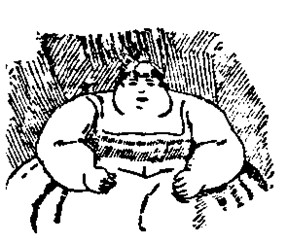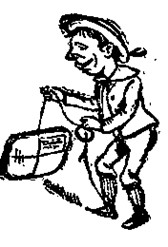This article has been transcribed from a copy of the Cardiff Times in the online collection of scanned Welsh newspapers 1804-1919 in the National Library of Wales, with grateful recognition of the free access accorded to all readers. Paragraph breaks have been introduced for easier reading.
Samuel’s attempts to elevate his account of this picnic to the level of pastoral poetry fails miserably in the face of mundane reality. The ‘feathered songsters’ in the trees within fifty yards around are ‘struck stone dead … with horror and astonishment’. Samuel resolves to eliminate anyone who sings the seventeenth-century song by John Hilton, ‘Come follow, follow, follow, follow, follow, follow me to the greenwood tree’. Misery and misfortune dog the picnickers, and the somewhat grumpy narrator gets no satisfaction from the darkened train, intended to provide young lovers with the chance of intimacy tabooed by their elders. In an earlier article Samuel calls on Lewis Carroll for assistance, and in the pictorial capital of the present piece he appeals to the other great children’s classic of the century, Carlo Collodi’s The Adventures of Pinocchio (Le avventure di Pinocchio 1883), represented by one of Enrico Mazzanti's universally loved illustrations. [Image 52-0] This text and its illustrations have in Italy an enduring popularity resembling that of Lewis Carroll and John Tenniel in Britain. David Skilton

een invited to a pic-nic, eh? H'm, don't think I shall go – know a bit about pic-nics, I do, sir. Generally a fearful preponderance of ladies even in the best regulated of pic-nics, and a consequent severity of taxation upon the pecuniary resources of the gentlemen. It is astonishing how [i]beautifully attractive pic-nics sound in the description of their projectors, and how sad and gruesome is often the reality. ‘Nice drive, you know; good breakfast at Feedwell’s Hotel; walks through the woods; luncheon on the greensward; lots of liquids; smokes: more ruralising; a dance, &c., &c., &c.,’ now all this sounds nice enough if it could be carried out in its integrity, but it very often isn’t.
About that walk through the woods – well, it is all very well when one is single and has not yet made up one’s book, but I should respectfully suggest that to the married man it is a nuisance. And very frequently when the party had taken a short cut to somewhere or other (guided by some unmitigated idiot who affects to know all about the place) it is turned back by an irate keeper, and has to go about eight miles round to reach the spot chosen for luncheon.
About that meal itself, now. I have scarcely ever known a picnic luncheon a success. Some driveller who undertook to provide knives and forks has left them in the coach or waggonette; the mustard has got loose and meandered into the apple pie; all the liquor has been shaken, and if you don’t want it nice and ‘thick’ you’d best not drink it; of course no one has thought of bringing a corkscrew (I never was at a picnic where the corkscrew had not been forgotten) and some ninny of a curate indulges in a long and monotonous grace. And the ground is damp, and the festive earwig appears on the scene, his attack being augmented by a huge army of caterpillars, which play havoc amongst the ladies, as the occasional screams denote (one of them gets a caterpillar down her neck, very likely), and when smoking part comes on it is discovered that there is scarcity of matches and someone takes too much of the liquid part of the luncheon, lurches over the cloth, and falls with his bead into the salad bowl; and somebody else turns jealous of his wife and glares all round, and when his wife sees that he is really annoyed and means having ‘bleed’ [drawing blood], she pretends to have a fit, just by way of exciting sympathy, and some great splay-footed fellow treads on the violinist’s instrument, which has just been placed at the greensward for a moment, and renders it a complete and dire wreck, and thereafter there is no music for the dancers save such as is provided by a very wheezy whistler; and one of the dancers stumbles over the root of a tree and pitches about seven yards right into the expansive bosom of the only fat man of the party, and the same time carrying with him a large portion of the dress skirt of his partner; and there is a subsequent staunching of a gory nose and a big run on pins, all available resources of the company in this respect being called in, and some young lady gives a loud yell and bolts away, followed by several other ladies who sternly wave the gentlemen back when they attempt to follow and render assistance. Subsequent inquiry bring to light the fact that the young lady who ‘screamt’ had discovered that a large beetle of uncertain species was slowly crawling up her stocking; and the fat lady of the party sits down in the most regrettable manner on the broken necks which had been knocked off in default of a corkscrew; she gives a dismal howl, refuses to be comforted, and says that it has ‘all been done on purpose’ by young Lambkin, who helped her to squat down where she did, and her daughter bursts into tears at this (thus revealing a tender interest in Lambkin), and ejaculates many times over, ‘Oh, don’t say that, mamma, poor Freddy would never do it.’
I have been at pic-nics, I can tell you, sir – pic-nics that were rained upon by a perfect deluge, this necessitating our packing the ladies (save those who were too stout to be thus treated) under the seats of the waggonettes, and I once had the misfortune to be at one where the provisions were altogether non est, they having gone on by mistake in the van of the train by which we travelled. I could stand pic-nics much better, sir, as a rule, if the vocal element were left out.

A lady who desires to join the party, but how shall we get her over the styles?
I have heard tell of picnics [sic] who struck all the birds (feathered songsters, I ought to call them) within fifty yards around stone dead with horror and astonishment till the little things dropped from the trees like over-ripe apples. I have registered a solemn vow, sir; I have sworn by all the tombstones (pawntickets, I mean) of my ancestors that I will have the gore of the first young woman who shall get up at any picnic where I am present and sing ‘Come, come, come to the greenwood,’ which ends up in a series of wild and maniacal trills such as might be expected to come from the padded room of a county asylum. The ‘funny’ man at a picnic, poor fellow, is generally a fearful fraud. He is only invited because he is ‘so funny, you know,’ probably, but when be acquires the toothache through sitting on the damp grass his fun is of a very churchyardy description. Of course he must sing a ‘comic’ song, and, as he has no proper accompaniment, this sounds like a dirge, and no one laughs, though he makes hideous grimaces with a view to tickling his audiences.

The bad old fashioned boy of the party, who lowers stones down on to the heads of courters sitting beneath rocks.’
No one seems to heed him after the outward journey and luncheon stage of the proceedings. The lovers have all paired off (how horribly selfish love is, after all), the lovers who have failed to pair off as they want are monosyllabic and nasty-tempered, the bibulous man is trying to recover from the effects of his luncheon by bathing in an adjoining stream, into which he ultimately falls, and thereafter makes a very unpleasant companion for the person next to him; the elderly folks are sleepy and restful, the juvenile of the party (of him more anon) is still guzzling away at one of the remaining fruit pies – the poor funny man hasn't a cat in the fire chance.
I have talked about accompaniments to the songs. Yes, and let me again come across the young man who brings his concertina with him, thinking that it may be useful – let me, I say, have five minutes with that young man, with his lugubrious, squeaky, puckered-up, baby-music tinglearum of a concertina and I'll crush him up like his own instrument. I believe that a young man who would play such a diabolical instrument would be capable of any species of infamy. But to more a pleasant matter. Ah, there’s the boy of the party. Well, I don’t know, after all, whether he’s a more pleasant matter. Never take a boy to a picnic, that’s my advice; he plays the very old mischief with everything. He puts live beetles into the mustard pot, he ties frogs to girls’ ribbons, he tells no end of stories at night about what he has seen from behind trees, and then both all the ladies and the young fellows look uncomfortable; he generally turns bad as a result of his gourmandising, he always loses his ticket, he hides himself under the carriage seat just as the train is starting, and when his father and mother, in an agony of apprehension, have stopped behind and the train has started, he suddenly begins to bark like a dog, seizes one of the ladies by the ankle, and generally creates old gooseberry till he is lugged out. Never take a boy with you to a pic-nic, take my ‘tip.’ On the closing scenes of the average pic-nic, on the return home I will discreetly draw the veil, but let me counsel such of your male unmarried readers as may go on such an excursion that it is always wise to ascertain before coming into the full light of a railway station (after riding in a dark carriage; I notice, by-the-way, that the lamps always go out in the pic-nickers' carriages) that you have not got an ear-ring stuck in your whiskers[.] Verb. sap.,[a word to the wise] ta-ta – by-bye.
Links to Related Material on Victorian Leisure Activities
- Victorian Leisure Activities (homepage)
- Punch, the Illustrated London News, and other Victorian Periodicals on Leisure and Amusements
Last modified 9 February 2022